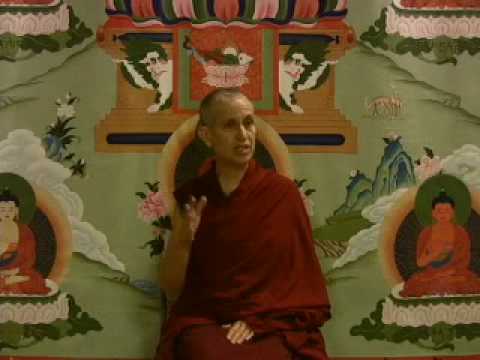Verse 25-1: Without ornaments
Part of a series of talks on the 41 Prayers to Cultivate Bodhicitta from the Avatamsaka Sutra (the Flower Ornament Sutra).
- Ornaments and meaning
- Transforming thought into virtue
- Self-esteem, practices, and intention
- Ego and motivation
Verse 25,
“May all beings be endowed with the twelve ascetic virtues.”
This is the prayer of the bodhisattva when seeing someone without ornaments.
Remember the previous one was when we see somebody with ornaments, then we think that, “May all beings have the marks and signs of a buddha.” Then when we see somebody without ornaments, we say, “May all sentient beings be endowed with the twelve ascetic virtues.”
Then you’re going to go, “Wait a minute, with ornaments, without ornaments, what’s the story?” What you see here is not a question of judging. It’s not that somebody is good if they wear ornaments and bad if they don’t, or bad if they do and good if they don’t. It’s just if somebody is wearing ornaments, this is how you transform it, to think a virtuous thought. If somebody isn’t wearing ornaments, that’s how you transform it, to think a virtuous thought. With wearing jewelry or not, it’s not a moral thing, it depends upon what’s going on in the mind.
As I was saying before, somebody could wear jewelry out of low self-esteem and wanting to attract attention to themselves. But somebody can do the ascetic practices also out of low self-esteem and wanting to attract attention to themselves, couldn’t they? “Oh look how ascetic I am,” or, “I hate myself so much therefore I have to torture my body.” It’s not the thing of whether you do or you don’t, it’s the mindstream behind it.
Similarly with wearing ornaments, somebody could be imagining themselves as the deity and wearing ornaments thinking of them as the marks and signs of the Buddha. Somebody could not wear ornaments and be thinking the virtuous thought of, “I don’t want to be attached to anything of this life.” Again, it’s not whether you do or don’t, it’s the mind with which you do or don’t. Are we clear about that?
Otherwise it’s very easy to get into all sorts of judgmental trips and ego trips about the whole thing. Either being, “Well, I’m a totally normal person, so I wear ornaments, I’m such a good practitioner,” or “I’m such an ascetic person, I don’t wear ornaments, I’m such a good practitioner.” It all comes back to ego, doesn’t it? The reason we’re doing this practice here is that whatever we encounter, we’re transforming it so that it’s not related to ego.
It’s the same thing whether you eat or don’t eat, or whether you do all sorts of different things or don’t do them, it depends on the motivation. Whether you have a cat or don’t have a cat, depends on your motivation. You could do it with ego either way or you could do it without ego either way.
Venerable Thubten Chodron
Venerable Chodron emphasizes the practical application of Buddha’s teachings in our daily lives and is especially skilled at explaining them in ways easily understood and practiced by Westerners. She is well known for her warm, humorous, and lucid teachings. She was ordained as a Buddhist nun in 1977 by Kyabje Ling Rinpoche in Dharamsala, India, and in 1986 she received bhikshuni (full) ordination in Taiwan. Read her full bio.


